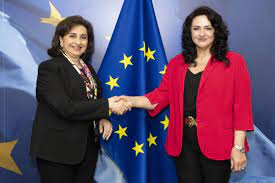EU committed to women empowerment

Brussels: On the occasion of International Women’s Day, celebrated annually on March 8, the European Union (EU) and he United Nations Educational, Scientific and Cultural Organization (UNESCO) reaffirm their steadfast commitment to promoting women’s empowerment and leadership. This pledge extends to advancing gender equality and women’s rights globally, integral to the fulfillment of the 2030 Agenda for Sustainable Development and its 17 Sustainable Development Goals (SDGs). With a united front, the EU and UNESCO emphasize that gender equality is not just a moral imperative but a foundational element necessary for the success of any development initiative.
Women, often the most vulnerable in conflicts, face disproportionate disadvantages in accessing resources, services, and basic human rights. This imbalance severely limits their potential and ability to contribute fully to society.
To boost the economic strength and resilience of women in Yemen, UNESCO, in partnership with the EU, has launched multiple interventions that provide the community with livelihood opportunities, specifically through employment in urban rehabilitation programs. Through the generous support of the EU, UNESCO has been implementing two projects in the field of culture representing a larger initiative spanning over 8 years of a leading role in the field of culture in Yemen. The Cash for Work: Promoting Livelihood Opportunities (2018-2022) and the Youth Employment through Heritage and Culture in Yemen (2022-2026) aim to provide economic relief to vulnerable youth by employing them in cultural heritage rehabilitation and creative industries within urban historic cities. This initiative not only focused on restoring cultural identity and historic heritage in targeted key cities but also supported cultural development initiatives in Yemen, thereby improving professional opportunities for the youth, with a strong emphasis on promoting gender inclusion.
Within the project’s framework, over 6,200 young people, including 657 women, were offered employment opportunities through various capacity-building and employment initiatives. The project also launched two specialized training programs in carpentry and the maintenance of interior limestone decorations, with 71% of the participants being women. This initiative led to the successful rehabilitation of ten historic houses in the Historic Town of Zabid, carried out solely by women who had completed these training programs, significantly enhancing their economic independence. The effectiveness of these programs highlights the potential for expanding such interventions with teams completely comprised of women, representing a notable progression in the project’s commitment to gender inclusivity and empowerment.
The initiative played a crucial role in reinforcing women’s economic and social resilience, by nurturing entrepreneurship opportunities and setting the stage for income generation and professional growth. It provided participants with the necessary skills, thereby enabling them to secure a livelihood, engage in personal development, and initiate professional pursuits.
Engaging young female architects to lead the field works of the project has been one of the goals of UNESCO’s interventions in the field of culture to foster an inviting culture for women in leadership roles. Among the beneficiaries is Nuha Albaqal, a young Yemeni woman from the Old City of Sana’a and an architectural engineering graduate from the University of Science and Technology in Sana’a. Nuha, along with thousands of other young Yemenis, dedicated her efforts to repairing and rejuvenating the city, aiming to inject new vitality into her homeland and contribute to its restoration.
‘’I still remember the family’s reaction after fixing the house, their joy, how the mother and young daughter cried. No one can comprehend the feeling; no matter how much I describe it, I still cannot convey how it felt that day,’’ notes Nuha Albaqal – Young architect
Despite the societal barriers, her determination has propelled her forward, making her a beacon of hope and resilience for many Yemeni women.
Reem Al-kebsi serves as the architect of the project and contributes to overseeing the technical aspects of the cultural heritage rehabilitation activities. She is supporting the lead cultural heritage expert in ensuring the quality, relevance and efficiency of the interventions in each of the targeted historic buildings. She played an important role in designing templates and reviewing the technical studies at the start of the project which are to be used throughout the implementation process. ‘’Revising 200 studies of the rehabilitation component of the project with UNESCO team was a privilege for a positive responsibility. The process and communication with 4 different technical offices across the country allowed for mutual understanding and development of adequate technical study model for each target city of the project. It was not an easy task, but it was worth the experience I gained.”
In the field of cultural and creative industries, gender representation tends to be more balanced. Many cultural operators and Civil Society Organizations (CSOs) in the cash-for-work initiative displayed significant female engagement across various roles.
For instance, the project supported a women led CSO in the Historic City of Aden, engaging 70 women in designing and marketing artistic products, thereby providing them with avenues to monetize their creations. This support extended to capacity-building initiatives for the CSO, which boasted a grassroots presence within the community but lacked institutional capacity. Such endeavors are crucial for ensuring the sustainable growth of organizations and fostering greater gender inclusion within community initiatives.
Not to mention, Yemeni House of Music and Arts (YHMA) launched a program to train Yemeni youth in crafting and playing the endangered Yemeni lute, Al Qanbus. This initiative aims to preserve traditional music while instilling cultural pride in the younger generation. Through intensive training, participants, including one Young Yemeni female, delved into the instrument’s rich history and techniques, fostering a deep appreciation for their musical heritage.
